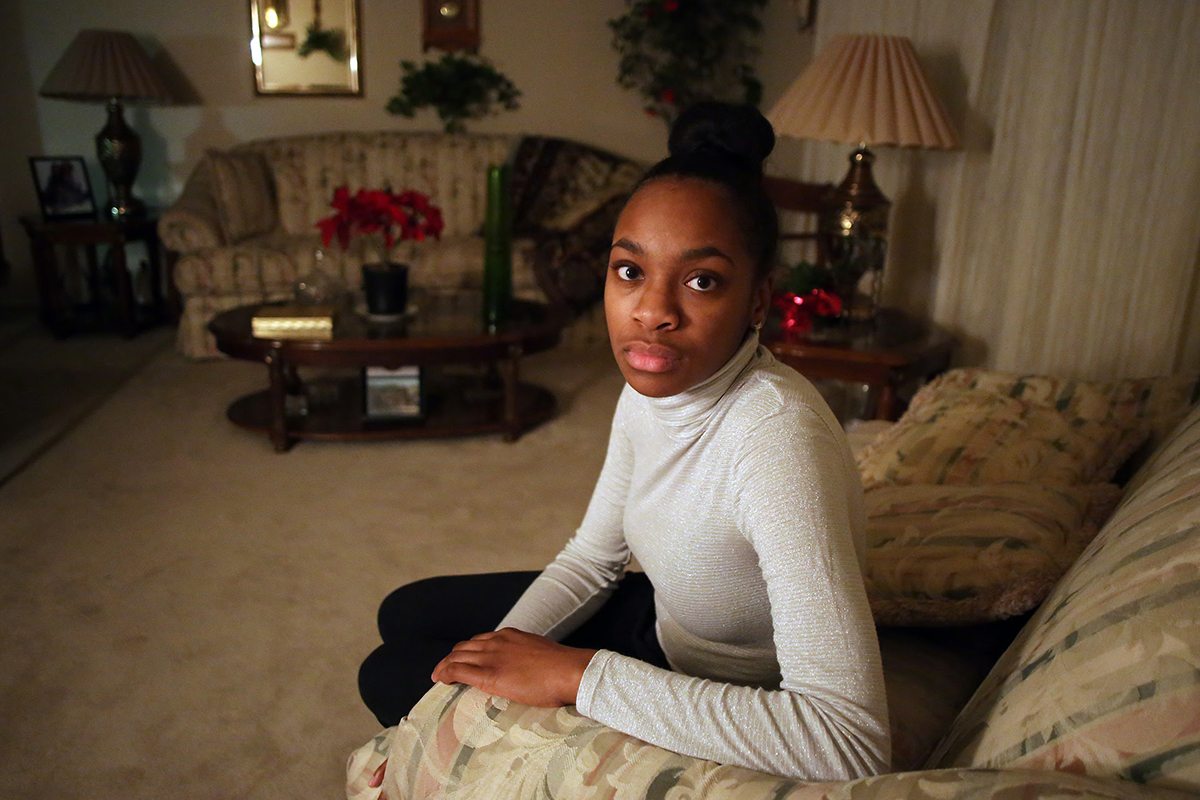Oakland Catholic senior Liza Wilson knows a girl whose birth control method with her boyfriend is ‘pulling out.’
Ciara Bailey, a senior at Winchester Thurston, says some of her peers think oral contraceptives provide protection from sexually transmitted diseases.
And at West Mifflin Area High School, sophomore Cheyenne Rhone often hears about students having unprotected sex and staying in negative relationships.
Those examples, the trio says, are proof that schools should teach comprehensive sex education and abandon abstinence-only lessons. “There’s way more to it to keep us healthy and safe,” said Ciara, 17, of Monroeville.
The girls, who are black teens, know that the stakes are higher for their peers, who disproportionately become pregnant, contract STDs or are victims of dating violence and rape compared to their white counterparts. That’s why they are part of an effort by the group GirlGov to push for comprehensive sex education at all schools.
“We should talk about condoms, contraception and not leave people out,” said Cheyenne, a 16-year-old from West Mifflin. “We should talk about how healthy relationships should be because people just don’t know that.”
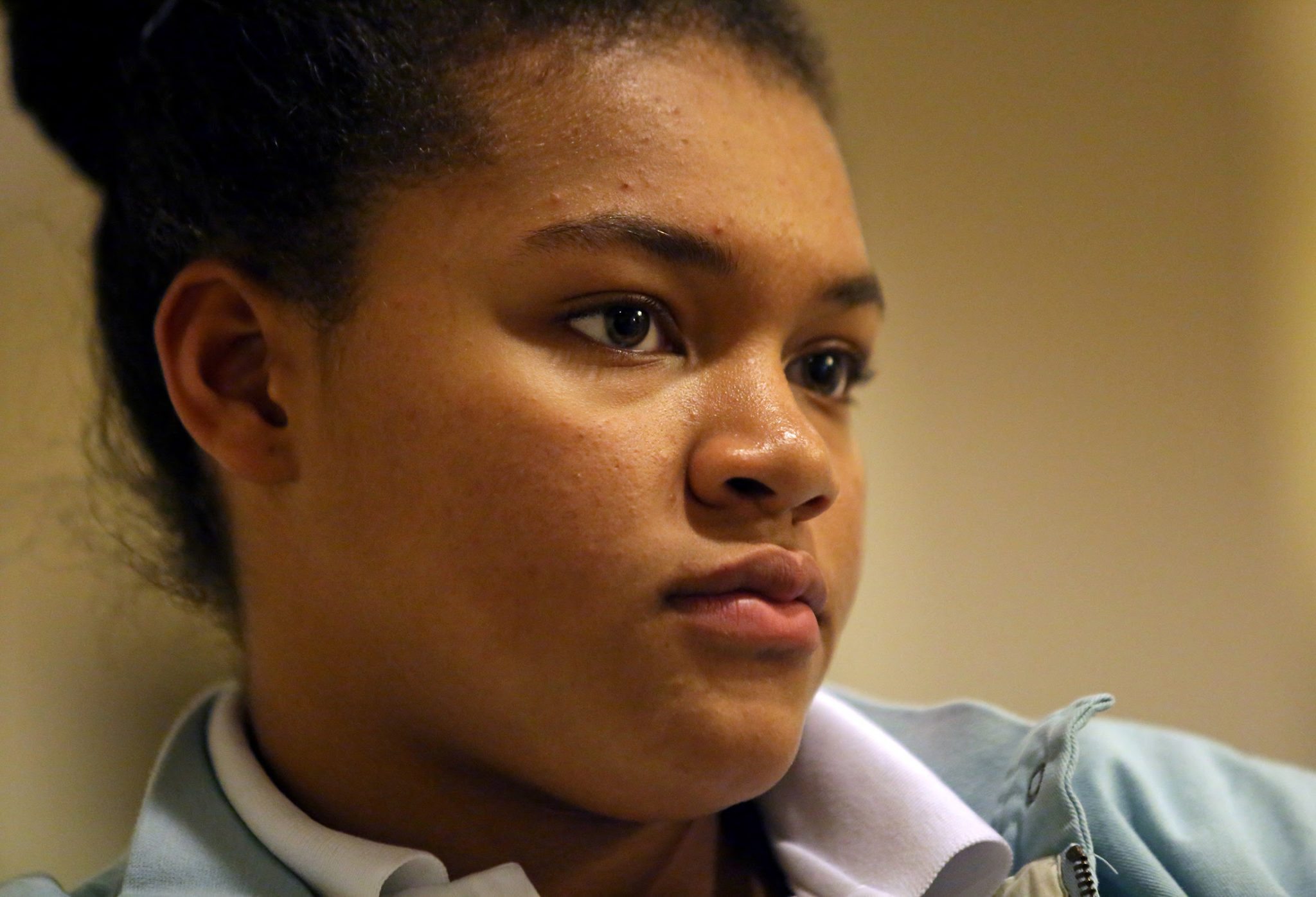
Oakland Catholic senior Liza Wilson worries her classmates won’t be prepared for the choices they will face in college because their school teaches abstinence only. She is part of GirlGov, a group that is advocating for comprehensive sex education. (Photo by Guy Wathen/PublicSource)
Push for information
Members of GirlGov, a program of the Women and Girls Foundation in Pittsburgh that teaches high school females about civics and leadership, will make presentations to their school boards in the coming weeks.
Of the 27 schools or school districts in Allegheny, Beaver, Washington and Westmoreland counties polled by GirlGov members, four had no official sex education curriculum, nine provided abstinence-only sex education and 14 offered comprehensive sex education programs.
The Pennsylvania Department of Education directs school districts to address abstinence, STD/HIV prevention, communicable diseases and relationships. It requires districts to teach abstinence as the only “completely reliable method” of preventing STDS. But the specific curriculum — how they teach it all — is left up to the districts.
Comprehensive sex education provides information on a range of topics, including abstinence, contraception, healthy relationships, disease prevention, decision-making and alternative lifestyles.
Sex education curriculum is approved by district school boards, and the topic can become controversial.
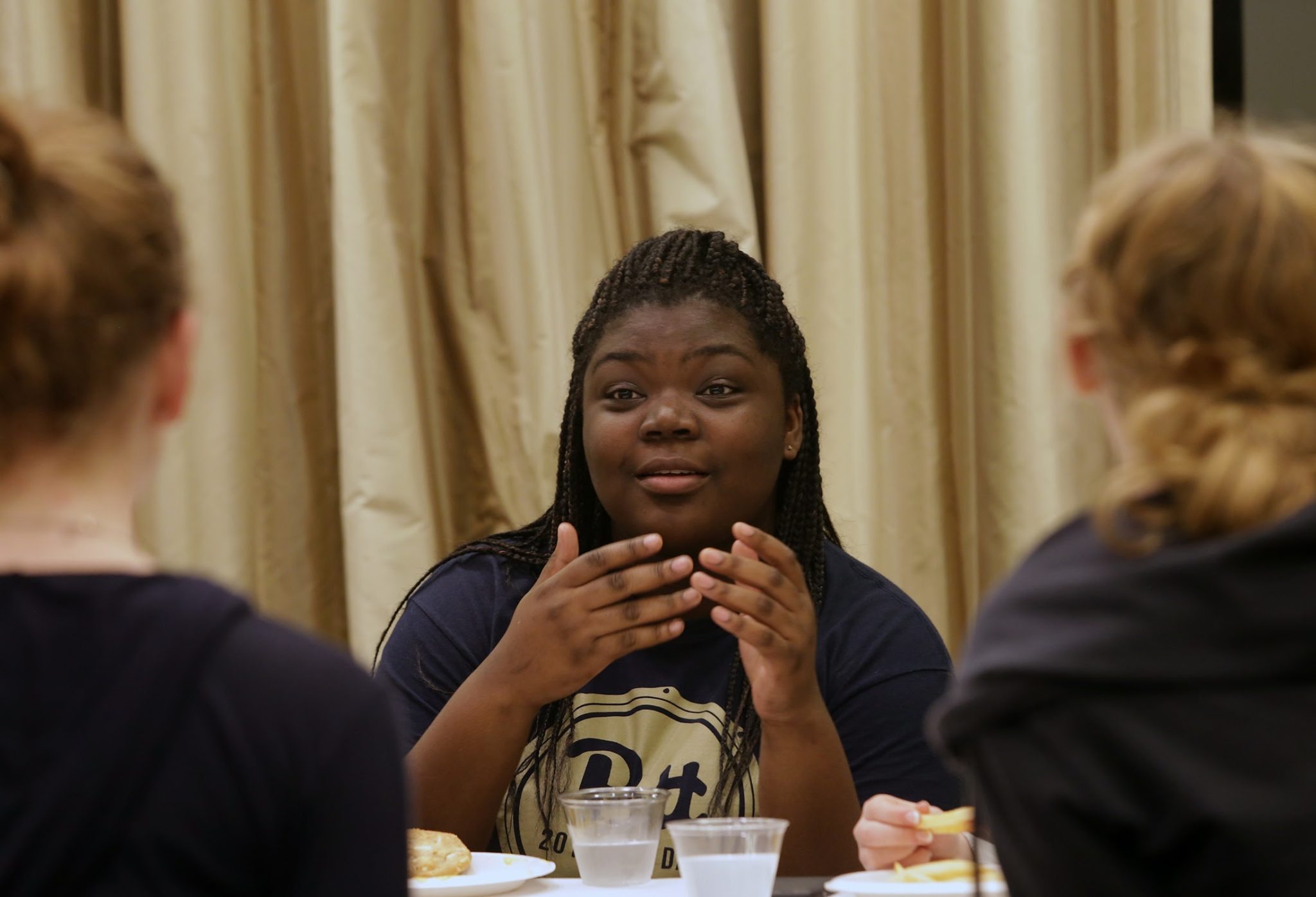
Cheyenne Rhone, a sophomore at West Mifflin, believes talking about healthy relationships and signs of abusive ones should be part of sex education in schools. (Photo by Guy Wathen/PublicSource)
In the Peters Township School District, parents filled a board meeting room in 2013 to protest a fifth- and sixth-grade curriculum that included information about pornography, abortion, birth control and transgender and homosexual lifestyles.
In contrast, a group of parents in 2009 urged the Pittsburgh Public Schools board to enact a more comprehensive curriculum that went beyond the abstinence-only lessons city students were receiving. At the time, 14 percent of births in the city were to women under age 20. The change was enacted, with only one board member opposing it.
Currently, Pittsburgh Public Schools teach comprehensive sex education that includes information about contraceptives, but does not allow for demonstration of contraceptives.
Some GirlGov students reported administrators were uncomfortable and skirted questions about their school’s sex education curriculum.
“Counselor is old white male who does not actually care about sexual education and its effect,” wrote one Pittsburgh Public Schools student. “His response to chlamydia fact was, ‘Hmmm…interesting,’ while playing with his phone.”
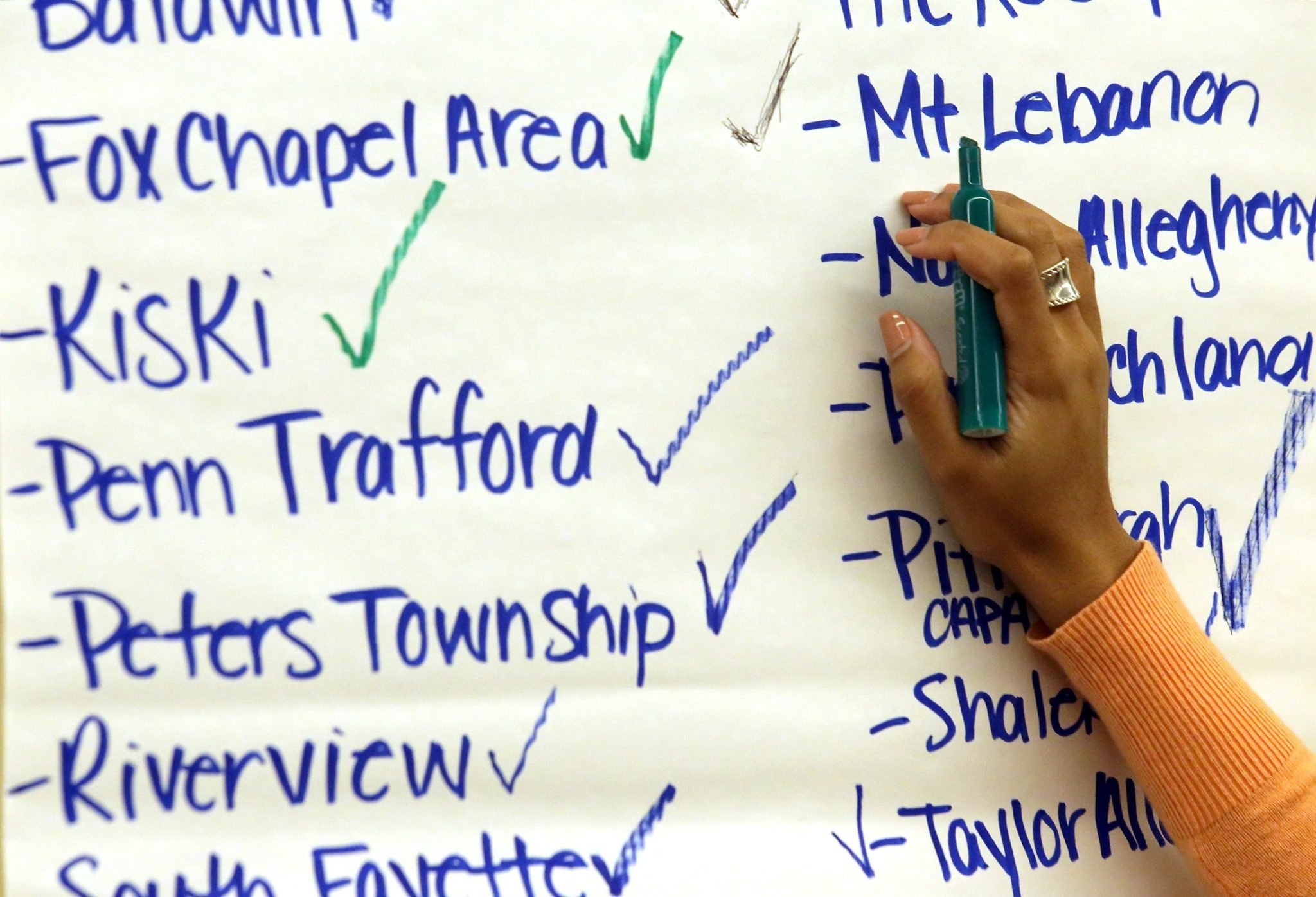
Blayre Holmes, the GirlGov program manager, marks progress made by the girls on figuring out school board procedures for each of the districts they polled about sex education curriculum. (Photo by Guy Wathen/PublicSource)
‘The full range of experiences’
A speaker in Cheyenne’s ninth-grade sex education class distributed cards with locations and contact information for centers where students could get pregnancy and STD testing and birth control.
At Winchester Thurston, Ciara received bits and pieces of sex education, mostly regarding the value of abstinence. She’s happy that her school adopted a comprehensive sex education curriculum this year. The Winchester Thurston Upper School dean, Matt Bachner, said the previous curriculum, which was only a “sliver” of health class, “wasn’t working to our satisfaction.”
The previous curriculum included information about birth control, but the new curriculum will address “the full range of experiences they might have, so they can make smart choices.”
At Oakland Catholic, the sole message to Liza is to save herself for marriage. “If you wait to get married to have sex, your husband will respect you so much more,” Liza, a senior, said she’s been told.
“We need to have at least a little bit [of sex education]. We have girls out there who think the best method is pulling out. The girls at Oakland, they are about to go to college. They are not going to be prepared, and it’s scary,” she added.
We have girls out there who think the best method is pulling out. The girls at Oakland, they are about to go to college. They are not going to be prepared, and it’s scary.
The U.S. Centers for Disease Control and Prevention recommends a 16-topic sex education curriculum that includes benefits of abstinence, use of condoms, prevention of STDs and information about healthy relationships. In 2015, it reported that less than half of high schools were teaching all of the topics.
Dr. Karen Hacker, director of the Allegheny County Health Department, supports comprehensive sex education. “There’s been very little evidence to show that abstinence-only programs have been successful,” Hacker said.
Locally, Fox Chapel and Upper St. Clair school districts provide abstinence-only curriculums.
“The Fox Chapel Area curriculum is abstinence-based, and our teachers explain to the students that the only way to remain free of STDs and to avoid pregnancy is abstinence. Teachers do not initiate discussions on birth control or condoms,” Fox Chapel spokeswoman Bonnie Berzonski wrote in an email.
In addition to Pittsburgh Public Schools and Winchester Thurston, the Mt. Lebanon, McKeesport, Sto-Rox and Woodland Hills school districts teach comprehensive sex education that includes information about contraceptives.
Other districts, including Mt. Lebanon, provide brief demonstrations and information on Planned Parenthood’s “It’s OK To Ask Someone” text line for information on sexual health.
“We trust our kids to make a lot of decisions about their classes, about their activities, about what colleges they are applying to. Sexual health should not be any different,” said Megan Fisher, Mt Lebanon High School health teacher.
Districts allow parents to opt their children out of any or all of the sex education lessons.
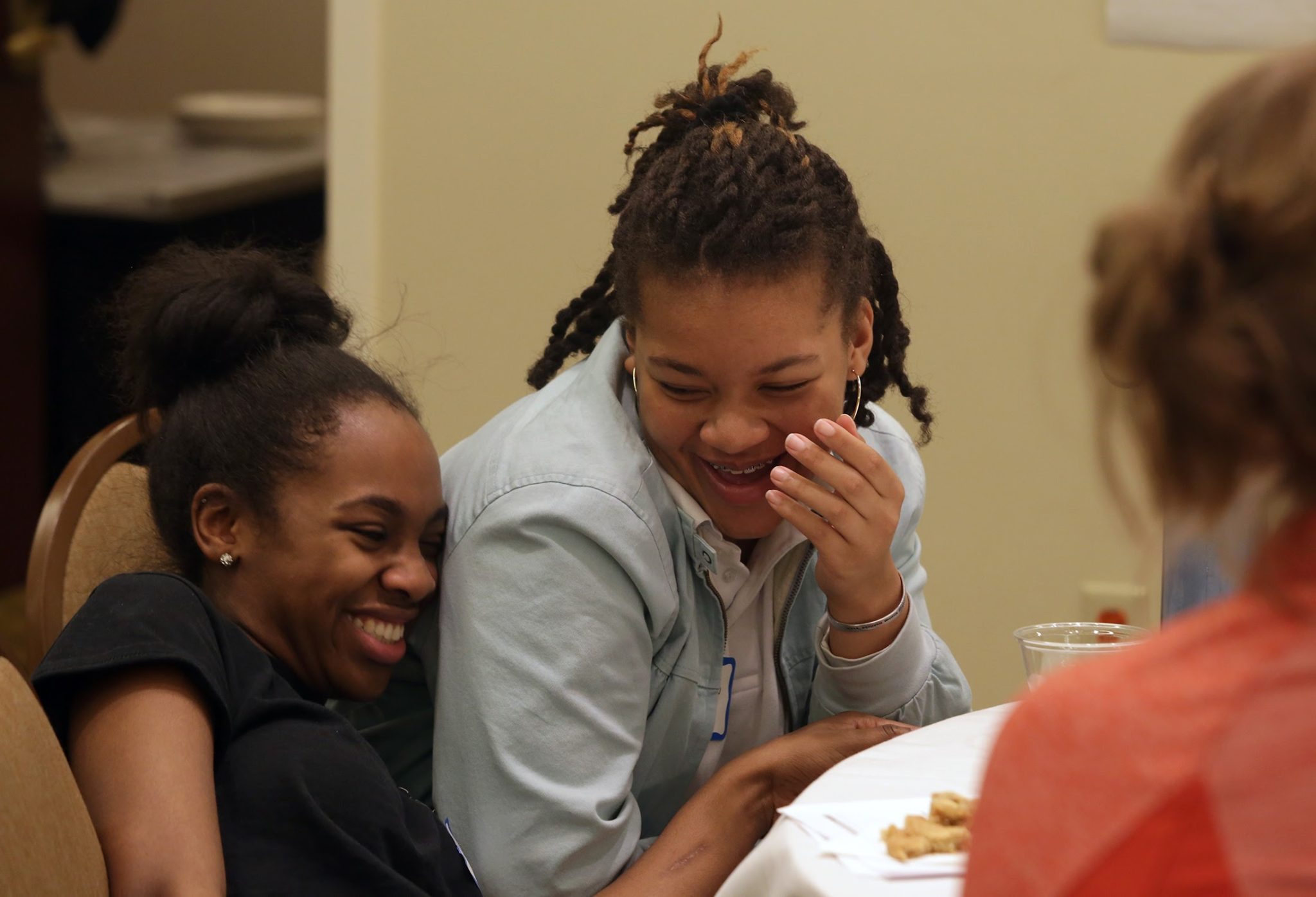
Ciara Bailey (left), a senior at Winchester Thurston, and Liza Wilson, a senior at Oakland Catholic, joke around during a February GirlGov meeting on the South Side. The group has polled area schools to discover what their sex education curriculums entail. (Photo by Guy Wathen/PublicSource)
STDs and pregnancy
Teen pregnancy rates have declined steadily in the county and state among all teens since 1990, but black girls 19 and younger are becoming pregnant at disproportionate rates.
In Allegheny County from 2010 to 2014, black teens accounted for 15 percent of black births, while white teens made up 3 percent of white births. The county numbers closely mirror the statewide rates.
More startling is the incidence of sexually transmitted diseases among black girls and young women in Allegheny County.
A county health department report on the increase of STDs from 2004 to 2014 showed black females ages 15 to 24 reported higher incidences of sexually transmitted diseases than white females. It calls for more education and outreach to that population.
According to the report:
- Black females ages 15 to 24 represented 28 percent of chlamydia cases in 2014 but those girls and young women accounted for only 1.2 percent of the total county population.
- Gonorrhea infections among black females ages 15 to 24 accounted for half of all female cases.
- Cases of syphilis doubled to 124 cases in the county from 2013 to 2014; 111 cases involved males. Of the 13 cases involving females, nine were among black females ages 15 to 24. No white females in that age range were affected.
White people will say “that’s because these black kids don’t know how to control themselves. The reason is because they are not being educated,” Liza said. “A lot of time, people of color don’t know and don’t have money. They don’t have the same access to resources. They are not taught.”
Healthy relationships
Black girls in Allegheny County are 50 percent more likely than white girls to experience teen dating violence, more than twice as likely to be raped and more than four times as likely to face threats of violence, according to the Healthy Allegheny Teen Survey, released in August 2015.
GirlGov members fear young women aren’t getting information needed to discern between healthy and abusive dating relationships.
“We think of abuse like hitting someone. But it can be stalking, keeping track of them or possessiveness,” Ciara said.
Liza referred to “coercive rape,” which she said occurs when boyfriends “keep asking and asking.”
“People who are in relationships feel like they owe something to their partner. Like at six months they should have sex. It’s a really unhealthy sense of owing something to someone else,” Ciara chimed in. Even worse, she said, “Some people feel you can’t rape someone if you are in a relationship.”
Liza said it’s common for her classmates at Oakland Catholic to be in unhealthy relationships with partners.
“Guys with really big egos that push them to do things that they aren’t comfortable with. No one is teaching them you don’t have to put up with that. They don’t know that these boys don’t really care about them,” Liza said.
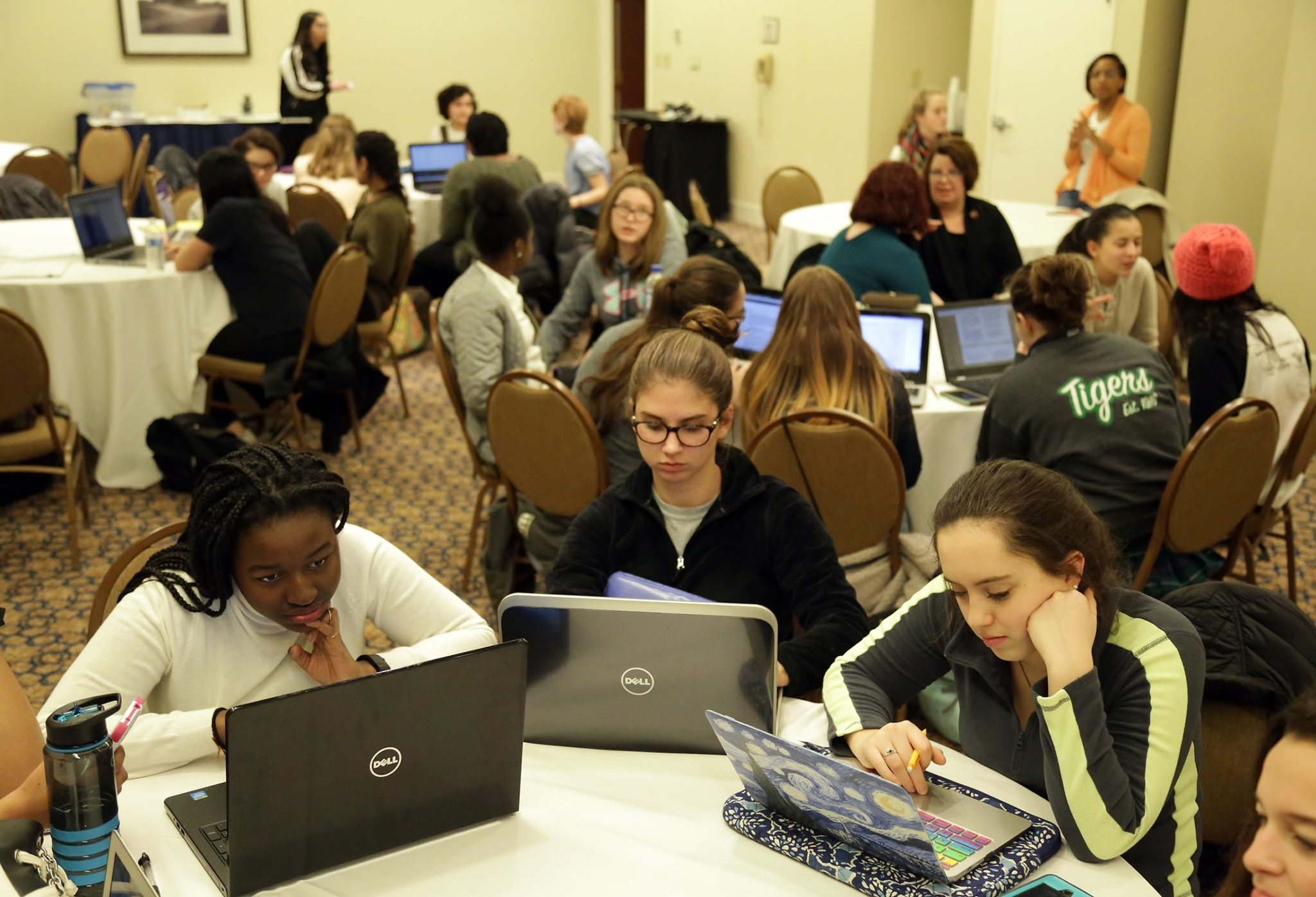
Zoe Vongtau, a Baldwin High School junior, Molly Kozy, a Carlynton High School senior, and Alexandra Plummer, a Pittsburgh CAPA senior, (left to right) conduct research on comprehensive sex education during a recent GirlGov meeting. (Photo by Guy Wathen/PublicSource)
Sexualization of black women
Ciara, Liza and Cheyenne said it’s common for black girls to be the target of sexual harassment based solely on their skin color. They’ve all experienced it.
There are comments like, “I’ve never dated a black girl” or “I’ve never tasted chocolate before” or “You are the prettiest black girl I’ve ever seen,” said Ciara. “It makes you feel disrespected, scared, out of control of the situation and helpless.”
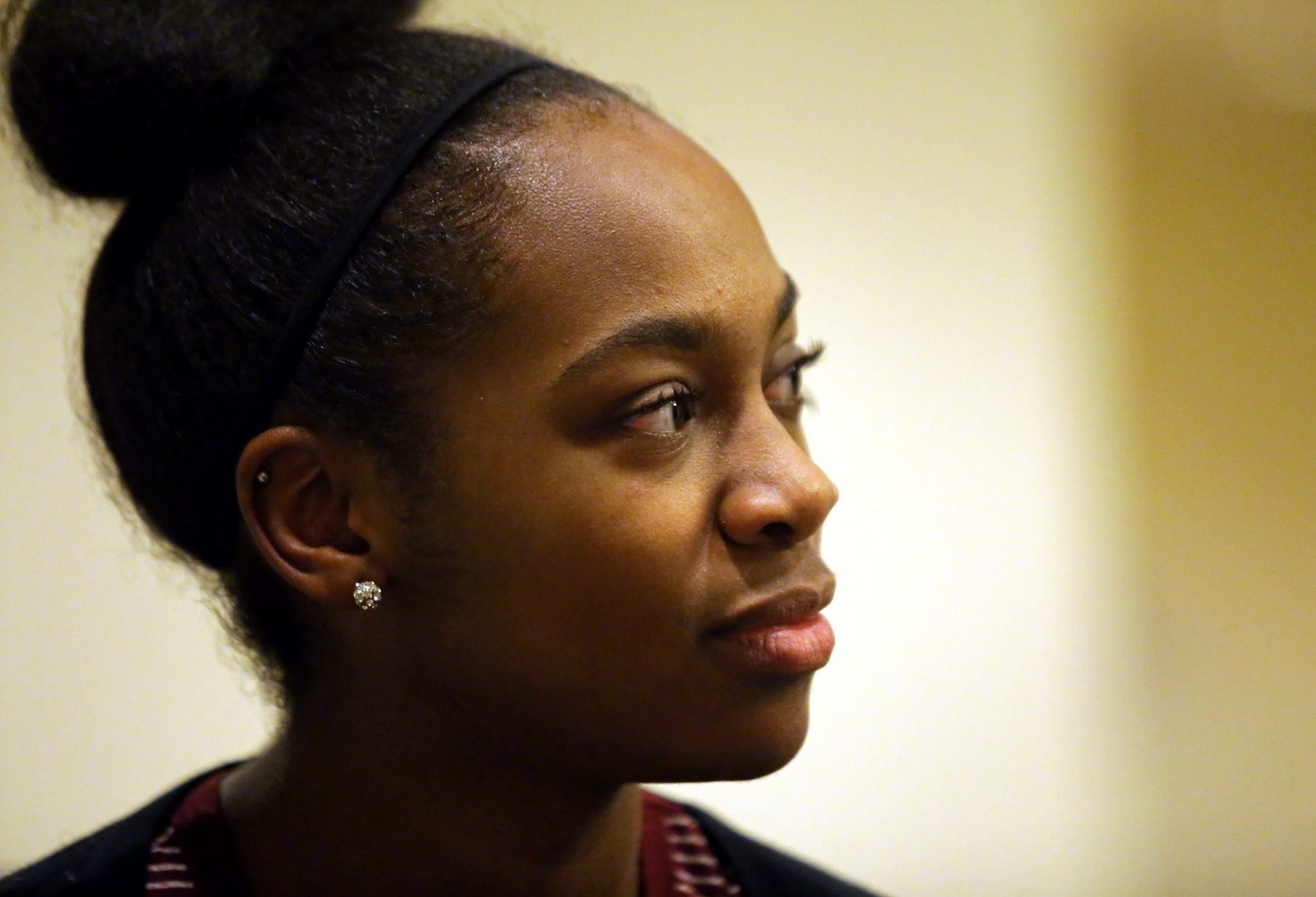
Ciara Bailey and other girls in her GirlGov cohort say that the oversexualization of black girls and women should be addressed in sex education. (Photo by Guy Wathen/PublicSource)
“Black women are over-sexualized and fetishized,” Liza chimed in. “Black women are seen as overly promiscuous. People comment that black women have big butts and are thick.”
They pointed to the Taylor Swift “Shake it Off” music video that features white dancers as elegant ballerinas and black dancers twerking, with a close-up shot of a black dancer’s rear end and a scene where Swift crawls between their legs.
The girls want to see the unfair depictions addressed as part of sex education.
“A lot of times the media uses black women’s bodies as props,” Ciara said. “Having your race be the only part about you is very offensive.”
Reach Mary Niederberger at 412-515-0064 or at mary@publicsource.org. Follow her on Twitter at @MaryNied.
